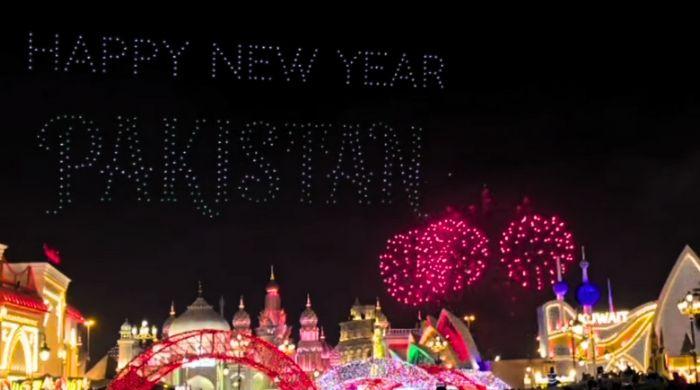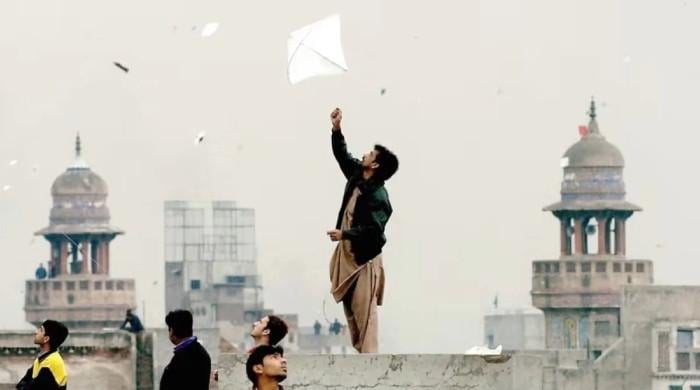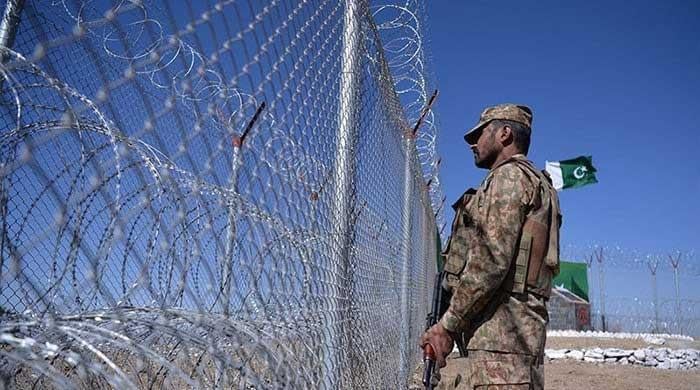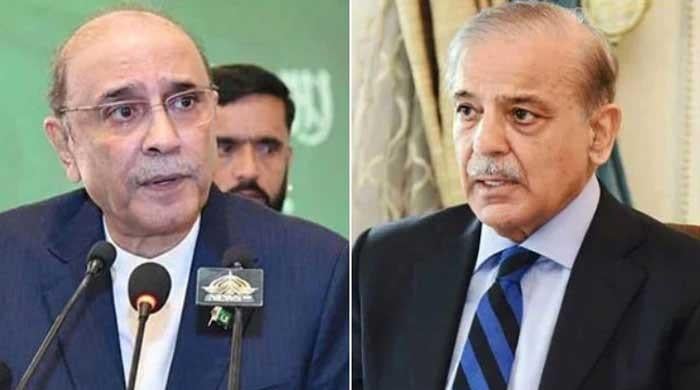Divided we stand
Even in the hour of grief our political leadership is busy playing politics and not ready to bury the blame game
October 26, 2016
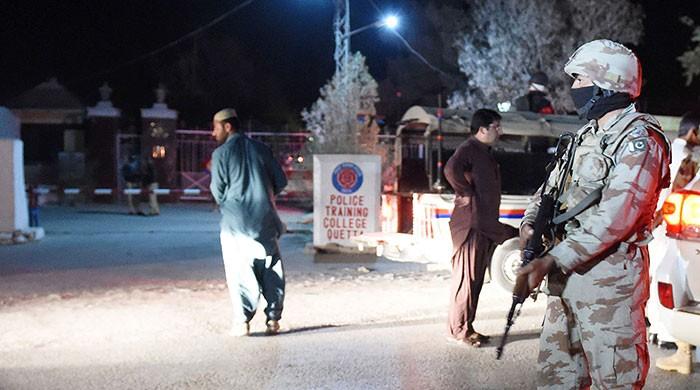
Even in the hour of grief, when over 60 young police cadets have been brutally murdered and over 110 injured including five army soldiers in Quetta, our political leadership is busy playing politics and not ready to bury the blame game, at a time when Balochistan mourns its second deadliest attack in three months.
The main opposition leader, Imran Khan, condemned the attack but levelled the most serious charge on Prime Minister Nawaz Sharif, calling him a 'security risk’. Similarly, PML-N leaders, using it as an excuse to blame the PTI chairman for creating a law and order situation in this difficult time, said he (Imran) wanted to create anarchy.
It clearly indicates that this time we may not see the kind of unity we had witnessed after the gruesome attack on the Army Public School Peshawar in 2014. Then, we emerged as a unified force, but today, we stand divided.
Monday's attack was the second biggest in Quetta in less than three months, since the suicide attack on the legal fraternity.
Nations bury their political differences at least in such situations, but it appears that we may not be able to see the post-APS unity nor any All Parties Conference. Imran alone is not responsible, but also the prime minister and his government, who failed in getting the National Action Plan implemented.
Imran's narrative about the PM has diverted the debate from 'Panamagate' to national security concern, which is very dangerous particularly in the aftermath of such incidents. One wonders whether the Pakistan Tehreek-e-Insaf leader really understands the fallout of calling the chief executive of the country a 'security risk' and accusing him of being an 'Indian agent’, and that too at a time when our intelligence agencies suspect RAW and Afghan intelligence's involvement in fomenting terrorism in Pakistan.
Back in the 90s, Nawaz Sharif and the then establishment suspected late Benazir Bhutto as a 'security risk’. I interviewed late General (R) Hameed Gul, former ISI chief, and he admitted that it was his mistake. "To be very honest, I regretted and even, in my meeting with her, told her about it. I found her a true nationalist.”
At a time when political tensions are high and understandably Imran would not like to give any space to his political rival, PM Sharif, a few weeks before his 'million march’, however, ethics suggests that at least he could have withheld his remarks may be for some other day.
And more importantly, if he really has any evidence to establish the PM as a 'security risk’, he should inform the concerned national security institutions, which certainly are more informed than him.
Calling someone a traitor, a security risk has become a fashion in this country and our politicians often accuse each other of being Indian and Israeli agents.
This is the time to mourn the death of our young cadets.
In December 2014, it was Army Public School, Peshawar and today it is the Police Training College, Quetta.
In both cases, children and young people were targeted. If in the APS, children were slaughtered, in PTC, young cadets were massacred.
No one can even feel the pain of the families whose loved ones lost their lives in this brutal attack. The time today demands that our political leadership join hands and go to their homes instead of merely issuing statements of condemnation.
It was surprising that despite high alert in Balochistan, preventive security measures were not taken outside the Police Training College.
True, the terrorists came from Afghanistan or were getting instructions from across the border during the massacre, however, this does not dilute the question of how they managed to travel with such sophisticated weapons and get through so many check-posts or patrolling points.
Why did the terrorists pick Balochistan and the Police Training College?
The college became a soft target as the authorities, perhaps, did not even consider that police cadets could become targets and, secondly, because of the presence of 'sleeper cells’, and non-state and anti-state actors in the province.
Foreign involvement in Balochistan from our hostile neighbour could also be a possibility after a recent peace initiative in Afghanistan and also after our recent diplomatic success over India on the so-called 'surgical strike' and the aftermath of the Uri incident.
But it could also be a reaction to the Army Chief General Raheel Sharif’s rejection of an appeal by terrorists against their death sentence awarded by the military courts.
These terrorists belong to different outlawed groups and are involved in sectarian killings as well as target-killings of police and paramilitary officials.
It is good to see that Prime Minister Nawaz Sharif and Army Chief General Raheel Sharif rushed to Quetta and one hopes that all mainstream political parties would also come on one page on this issue.
No doubt, it is the worst incident in Quetta since Mr Sanaullah Zehri replaced Dr Abdul Malik as chief minister, and also under a new Chief of the Southern Command.
Sources believe, perhaps, that the terrorists took advantage of the situation as the authorities apparently got relaxed after a peaceful Muharram.
One still waits for complete details as to how these terrorists managed to get inside the secured area and how brutally they killed the cadets, but it has certainly raised many questions about the inaction on the threat alert.
One of the deadliest attacks in 2016, it is also a reminder to the world that Pakistan is the worst victim of terrorism, and more than 60 deaths would only increase the death toll in the war against terror to around 65,000 since 2002.
Federal Interior Minister Chaudhry Nisar Ali Khan is right when he says that despite major success in the operation, one big incident like the one in Quetta leaves many questions unanswered as to why we get relaxed.
It’s quite alarming to see that, despite general and specific threat alerts, concerned authorities don't take preventive measures or action against the responsible officers after terrorists succeed in their attempts. It happened in the case of the attack on the Jinnah International Airport, Karachi's old terminal, two major jailbreaks in Bannu and Dera Ismail Khan, and the APS massacre.
The intelligence network has certainly improved which has resulted in giving the specific information, in some cases even the possible date of attack, but the failure seems to be at the provincial and local security level, which is a major breach particularly when the terrorists allegedly not only managed to get release of the most dangerous terrorists but also killed people inside the prison. In the Karachi airport case, authorities were informed even from which gate and in which car the terrorists could arrive.
If the intelligence agencies had timely informed the concerned authorities about the specific information, the failure of the provincial government or local security agencies could be cited as major criminal negligence.
It remains to be seen whether there was a general threat alert for these days and places but if the information was specific and no proper measures were taken, then the provincial government should be held responsible.
The Quetta attack is once again a wake-up call after we forgot our responsibility in the aftermath of APS Peshawar attack.
Following the success of operation Zarb-e-Azb, there has been a lot of improvement in the overall law and order situation and terrorist attacks have also been on the decline, but an attack such as the one we witnessed on Tuesday once again reminds us of the possibility of ‘surprise attacks' and that too in highly secured areas.
Terror networks through such attacks manage to get huge media hype and attention particularly if they target police or army personnel.
Officials also suspect the possible involvement of a 'foreign hand' at a time when some fresh peace initiatives have given a sign of hope in Afghanistan.
The attack also came at a time when only a month back some major decisions had been taken for the fast implementation on the National Action Plan.
It's about time for the nation to show complete resolve to fight and win this war against terrorism and extremism.
—The writer is a senior columnist and analyst of GEO, The News and Jang.





